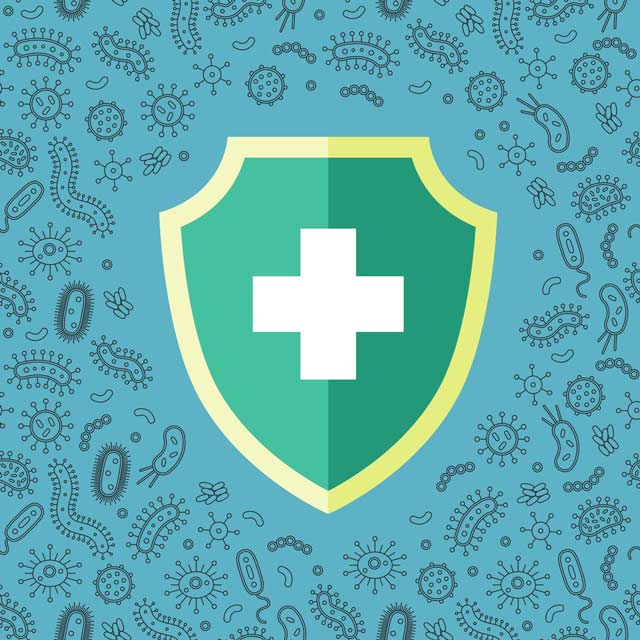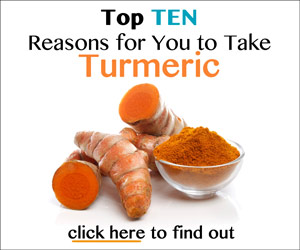How Can Turmeric and Turmeric Compounds Help Enhance the Immune System and Cell Activity?

Turmeric and turmeric compounds interact with the immune system as well as the other body systems at the biochemical level, in a number of beneficial ways. Depending on the disease or condition, turmeric compounds stimulate or suppress production of proteins that directly or indirectly help bring processes back into balance. Some of the protein and enzyme factors involved in inflammation and inflammatory conditions that turmeric and its compounds affect include: (iii.1, 2)
- Transcription Factors and Co-Factors
- Cytokines & Chemokines
- Pro-Inflammatory Enzymes (such as COX-2)
- Cell Growth Cycle Proteins
- Growth Factors and Receptors
- Cell Adhesion Molecules (CAMs)
- Kinase Enzymes
Turmeric Compounds Help the Immune System Work Better
Turmeric compounds can also enhance the immune system by helping it work better. For example: (iii.1, 2)
- Macrophages and natural killer cells are part of the immune system's arsenal. Low concentrations of curcumin inhibits macrophages from producing inflammatory cytokine proteins and free radicals while at the same time stimulating natural killer cells to help get rid of cancerous cells. (iii.1)
-
Autoimmune diseases activate immune system cells such as macrophages and lymphocytes that trigger proteins called transcription factors. These then stimulate production of inflammatory cytokine proteins and adhesion molecules that can cause tissue damage. Turmeric compounds can help prevent and counteract this activity. (iii.8)
Curcumin decreases elevated levels of the inflammatory cytokine IL-12 that activates immune system type 1 T-cells (Th1). Th1 cells are involved in autoimmune system disorders such as inflammatory bowel disease (IBD) and rheumatoid arthritis. In multiple sclerosis they destroy the outer myelin sheaths of nerve cells and the cells that make myelin. (iii.8, 9)
In IBD and allergies, curcumin also helps regulate Th2 cell response. However, animal studies suggest turmeric may be better at relieving symptoms of food allergies. In some instances, curcumin appears to simply suppress the immune system response. Turmeric may be more effective because it helps balance and regulate it. For example, turmeric promotes Th1 levels while reducing higher levels of Th2 cytokines caused by a food allergen. (iii.10, 11, 118)
- Curcumin improves the phagocytic activity of macrophage cells to help get rid of plaque-building protein fragments in Alzheimer's disease. (iii.12)
- Turmeric compounds may also help prevent damage from inflammation and organ rejection in kidney transplants. (iii.13)
Curcumin's Effects Depend on Timing, Dosage, and Type of Cell Involved
The turmeric compound curcumin can either increase or reduce the production of proteins, depending on the circumstances, including:
Normal or abnormal conditions. Curcumin's effects on proteins can manipulate dysfunctional cells in ways that could cause harm to normal cells. However, research in animals and humans demonstrates that its activity is limited to the diseased cells—even in the same test subject. (iii.11)
Type and stage of condition or disease. One of the most obvious illustrations of how turmeric compounds behave differently depending on the specific disease stage is curcumin's effects in cancer. (iii.14)
For example, curcumin promotes production of transcription factors that trigger genes to produce antioxidant proteins. Antioxidants block the carcinogenic changes in cells caused by free radical damage. This helps prevent cancer from developing. (iii.14)
Conversely, one of the ways curcumin can kill existing cancer cells is decidedly opposite its well-known antioxidant activities. It targets and collapses the membranes of mitochondria that make energy in cells. By doing so, curcumin stimulates production of pro-oxidant free radicals that cause malignant cells to die. (iii.14)
The activity of turmeric compounds is also disease-dependent. For example, curcumin behaves as an anti-angiogenic substance in cancer by inhibiting the growth factors that stimulate blood vessel and tumor growth. However, it exhibits pro-angiogenic effects by stimulating the same types of growth-promoting proteins to help wounds heal faster in people with diabetes. (iii.15, 16)
Organ Involved. Depending on where cancer occurs can dictate how turmeric compounds help kill or stop the progression of cancer cells. For example, in many cancers curcumin works by blocking the transcription factor NF-κB and the oncogenes and proteins that it stimulates. (iii.17)
In brain cancer, however, inhibiting NF-κB has little to no effect. Yet in both lab and animal studies curcumin inhibits aggressive, deadly glioblastoma-brain tumor cells. Researchers in Germany determined that in this type of cancer curcumin blocked STAT3 transcription factor proteins. By doing so curcumin significantly increased survival time in animals with transplanted glioblastomas. (iii.17)
Dosage. How turmeric compounds such as curcumin behave in the body also depends on dosage. To illustrate, high doses of curcumin induces the death of fibroblast cells that overproduce collagen protein when wounds are healing. Collagen is one of the main components of the connective tissue in skin. Limiting overproduction of collagen can help prevent scarring. (iii.5, 18)
Even though curcumin has powerful antioxidant properties, it behaves as a pro-oxidant in this situation by stimulating production of free radicals. Administering low doses of curcumin first, however, stimulates antioxidant enzymes that help regulate the rapid wound-healing effects of curcumin. (iii.5, 18)
Combination Effects with Other Herbal Compounds and Pharmaceutical Drugs. Turmeric compounds can enhance the beneficial effects of both natural and pharmaceutical compounds. For example, in lab studies, the combination of epigallocatechin gallate (EGCG) from green tea and turmeric's curcumin blocked the growth of uterine leiomyosarcoma (LMS). (iii.19, 20)
LMS is a chemo-resistant, aggressive, sarcoma type of cancer. EGCG increased the amount of curcumin taken up by the LMS cells, where they both inhibited Akt transcription factor and mTOR kinase proteins that promote progression of LMS tumors. (iii.19, 20)
The effectiveness of combining turmeric compounds with other treatments depends on not only the substance, but also the delivery procedure. When used with green tea extracts, research suggests administering curcumin after EGCG (rather than at the same time) is crucial to increasing the death of B-chronic lymphocytic leukemia cancer cells. On the other hand, curcumin appears to work well at increasing the effectiveness of the chemotherapy drug vincristine when combined at the same time. (iii.19, 20)
Join the 1000s of People Who Are Discovering the Benefits of Turmeric.

Healthceuticals® Turmeric Curcumin Complex
100% Certified
Organic ingredients
- Organic Turmeric Extract - standardized to 95% curcuminoids.
- Organic Whole Turmeric - provides full spectrum antioxidant, anti-inflammatory turmeric benefits, including turmerones and numerous vitamins, minerals, and phytonutrients
- Organic Black Pepper Extract - standardized to 95% piperine; dramatically enhances bioavailablity.
- Organic Phospholipids - markedly improve absorption.
- Organic Ginger - works synergistically with turmeric to provide more powerful benefits.
- Absolutely FREE of potentially harmful additives and fillers such as magnesium stearate.




